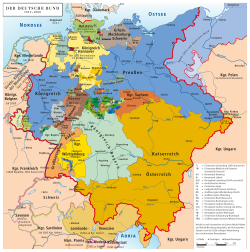German Empire (1849)
| German Empire | ||||||||||
| Deutsches Reich | ||||||||||
|
||||||||||
|
The German Empire in 1849, consisting of the area of the German Confederation.
|
||||||||||
| Capital | Frankfurt | |||||||||
| Government | Hereditary Monarchy | |||||||||
| Emperor | ||||||||||
| • | 1849 | Frederick William IV1 | ||||||||
| Imperial Vicar | ||||||||||
| • | 1849 | Archduke John | ||||||||
| Legislature | Frankfurt National Assembly | |||||||||
| History | ||||||||||
| • | Revolution of 1848 | 1848 | ||||||||
| • | Frankfurt National Assembly dissolved | 31 May 1849 | ||||||||
| • | German Confederation restored | 1850 | ||||||||
|
||||||||||
| 1: Frederick William IV was offered the imperial crown, but refused to "pick up a crown from the gutter". | ||||||||||
The German Empire (German: Deutsches Reich) was a short-lived nation state which existed from 1848 to 1849. It was created by the Frankfurt Parliament in spring 1848, following the March Revolution. The empire officially ended when the German Confederation was fully reconstituted in the Summer of 1851, but came to a de facto end in December 1849 when the Central German Government was replaced with a Federal Central Commission.
The Empire struggled to be recognized by both German and foreign states. The German states, represented by the Federal Convention of the German Confederation, on July 12, 1848, acknowledged the Central German Government. In the following months, however, the larger German states did not always accept the decrees and laws of the Central German Government and the Frankfurt Parliament.
Several foreign states recognized the Central Government and sent ambassadors: the United States, Sweden, the Netherlands, Belgium, Switzerland, Sardinia, Sicily and Greece. France and Great Britain installed official envoys to keep contact with the Central Government.
The first constitutional order of the German Empire was the Imperial Law concerning the introduction of a provisional Central Power for Germany, on June 28, 1848. With the order, the Frankfurt Parliament established the offices of Reichsverweser (Imperial Regent, a provisional monarch) and imperial ministers. A second constitutional order, the Frankfurt Constitution, on March 28, 1849, was accepted by 28 German states but not by the larger ones. Prussia, along with other German states, forced the Frankfurt Parliament into dissolution.
...
Wikipedia



